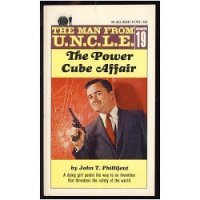The Corfu Affair - Phillifent John T. (хороший книги онлайн бесплатно .TXT) 📗
Klasser stiffened, squirmed back in his chair. "You shall not drill a hole in my head! It is out of the question!"
"I expected you to be concerned, Herr Doktor. But, as you shall see, it is a simple and painless operation, taking no more than twenty minutes or so. I will do it now, for you to see, on M. Solo!"
He had seen this coming. He strained helplessly at his bonds as she moved round the table to come near him. From somewhere she had taken up a slim case, from which the now took a hypodermic, which she held expertly.
"You shall see. I will insert one unit into M. Solo's brain. From that moment he will appear to be normal, but will be my slave. It is my regret, of necessity, that I cannot perform this operation on myself, but I will be able to control him quite well. And use him. I have done it before. And then, gentlemen, you will be convinced!"
CHAPTER SIX
THE taxi fled down the Rue Hebert as if trying to qualify for the Monte Carlo rally. In the back, Illya Nikovetch Kuryakin ignored the speed. He had ridden in Paris taxi cabs before. He had done many odd, uncomfortable and dangerous things before, but never had he felt about them as he did about this one. For some inexplicable reason a sense of doom had perched on his shoulder all through the operation, ever since he had parted from Napoleon Solo.
Not that he'd had much time for brooding. One week had been spent in saturating himself in technical information, then the next two weeks had kept him inside the Soviet Union. There he had been passing himself off as Maurice Krasnin, a French-born Slav, a biomedical technician with one foot almost outside the law. Three days in Moscow had been enough to create the necessary background, the rest of the time he had spent in Tashkent, as the undercover center of the Soviet shadow world of plastic surgery and crooked science. His life had been a fiction, but he had to smile, thinly, now as he realized how easily it could have been true. There was a vast untapped potential in his mother country for men who could mould and manipulate the external appearances, legally and otherwise. His pretended purpose had been to forge a link between centers in Tashkent and the notorious possibilities inherent in the Paris center of St. Denis. It would have been terribly easy to really do just that.
So on the surface the project had been easy, but there were undercurrents that he had not cared for, signs that meant, to his eye, a breaking down of the values that had kept the Soviet Union going along a hard path. The subtle demoralization of affluence was having its effect here just as it was everywhere else. While he no longer had any loyalties to the Soviet, he did have boyhood memories and a degree of fellow feeling for the Russians, and the prospect had chilled him.
Adding to his gloom was the need to create an appearance. By habit he could be comfortable with a degree of untidiness, but that was not enough. People had certain fixed mental images about Russians, and he had to do his best to live up to them. Furthermore, this was no case for any painted-on disguise. A man who intends to move among highly skilled cosmetic surgeons needs more than greasepaint and facial putty to create an impression. For three weeks he had not shaved, and was now sporting a yellow wisp of beard disreputable enough to satisfy the wildest imagination. In the same period he had washed his hair regularly with a hard soap, deliberately neglecting to rinse it properly. As a consequence his hair was straw-yellow, dull and spiky. He wore a dark chunky sweater, a coarse-weave jacket with a touch of fur at the lapel, hairy pants and high boots. The overall effect was convincing, but highly uncomfortable to one of his temperament. He preferred to be inconspicuous.
The taxi slowed, halted, and he scrambled out, dismissing his inner preoccupations and tensing himself to match wits with the people in charge, here at St. Denis Surgery-Cosmetique. From the outside, no one would have taken the dingy old building for a medical house of any kind, but once inside the funereal doors and into the lobby all was hygienic chrome and glass, plus efficiency. A lady receptionist advanced to take his card. She managed, without effort, to make her plain black dress look chic, as only a Parisienne can. After a glance she nodded, moved away, gesturing him to follow.
"Venez avec moi, monsieur. I will discover if M. Lafarge is free to receive you. One moment."
She went before him to a desk, touched an intercom button and spoke in a rapid undertone. Beyond the wall, in his luxurious paneled office, Managing-Director Louis Lafarge hushed his very important guest with an apologetic palm and attended to the call. Nodding, he made a quick decision, then turned again to his guest.
"A thousand pardons, monsieur, but you will realize that business is business. If you will please retreat into the next room I will dispose of this matter very quickly and then we can talk more." The covering door had barely closed when a discreet tap at the outer door announced the receptionist.
She entered one pace, stood aside, and announced, "Mr. Boris Krasnin, from Tashkent, M. Lafarge."
"Bonjour, monsieur!" Kuryakin inclined his head, managed to convey the impression of a heel click without actually doing it, and advanced over the carpet. "I believe you are expecting me?"
"Of course!" Lafarge beamed and made gestures, but his alert attention missed nothing of his visitor's appearance, or his faultless accent. "I have your dossier right here. Yvette! You will request Gerda to come to me, at once, please! Now, M. Krasnin. A seat? You would care for a cigarette, no? An aperitif, then? It is good!" He produced a bottle and poured busily while making conversation. "You will pardon if I seem naive, but it is a strange thing to me that your people should be interested in our kind of work. After all, the Soviet Union has a great name for medicine and surgery, and the many inventions of all kinds. Yet you wish to do business with us?"
"It is not so strange. Tashkent may be just a name to you, monsieur, but think. That area is now Uzbekistan, a preferred name in the new regime, but it was once Bokhara, famous for arts, beauty, the bourgeois things. The spirit is still there, but driven underground. It is not healthy, nowadays, to want to be beautiful, or different. Yet people want it, and where there is a demand, there will be a supply."
"Quite so!" Lafarge nodded agreement. "That is one rule which does not change." He looked up as a tap on the door heralded an interruption. With a scowl he called out, "Entrez!"
The door opened to admit a lean, dark-haired woman whose face was set in a severe and suspicious expression. With no more than a glance at Lafarge, she advanced to where Kuryakin sat, brought her left hand from behind her back to thrust it in front of him, fist clenched.
"Kak eto nazivayetsya po rooski?" she demanded, and opened her hand to reveal a small gilt and red enameled tube.
"Pomada dlya goob," he sneered. "Are you trying to trick me, madam? Or you, monsieur?" He turned to spear Lafarge with an icy blue gaze. "This was so obviously prepared, to have this stupid woman brought here, and for her to ask me to give the Russian name for a lipstick. What are you trying to prove?"
Lafarge spread his hands and shoulders in an eloquent shrug. "It was no more than a precaution, M. Krasnin. I have to be sure. Identities and names are so easy to fake. The name Krasnin means nothing to me."
"Names seldom mean anything to anyone. In England, once, I knew a girl called Cecilia Duff, if you can believe that. It was her real name. So what have you proved?"




